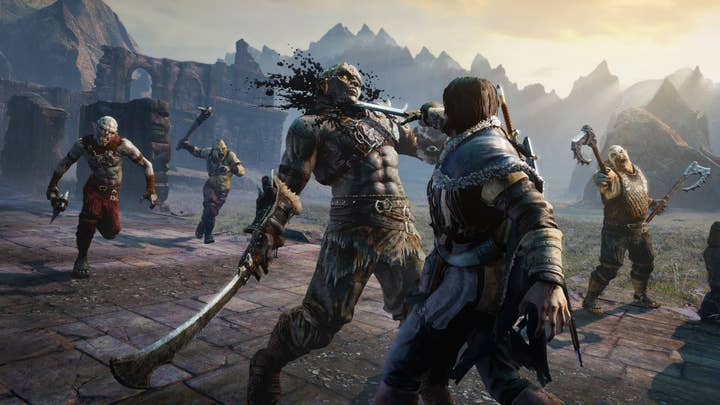Dan Abnett: “Story should be the spine of your game”
The best-selling novelist and writer for both comics and video games discusses the increasing importance of a solid narrative
Dan Abnett knows a thing or two about writing.
He is a seven-times New York Times bestselling author, with over fifty novels to his name. He has written for hugely popular Marvel and DC comics, including the 2008 Guardians of the Galaxy stories that inspired the Hollywood movies, as well as both comics and novels within the Warhammer universe. And he has written for several blockbuster video games, including the acclaimed Alien: Isolation and Middle-Earth: Shadow of Mordor.

Ahead of his talk at next week's Develop:Brighton conference, we asked him for his thoughts on the standards of narratives in video games - widely considered to be improving but still compared unfavourably to other entertainment mediums.
While Abnett believes the quality of current games writing is "high, with a great deal of imaginative and clever new approaches being devised" - especially within the indie space, he observes - the author also warns there are some major challenges to overcome and a lot of room for improvement.
"The sheer popularity of the biggest games - although not all of them - tends to force over-simplicity in story," he tells GamesIndustry.biz. "[There's] the notion that if the visuals are amazing and the action plentiful, you can get by on a very rudimentary story. The same criticism might be levelled at blockbuster movies - the whole notion that a big 'wow factor' can excuse lapses in logic, continuity or even sense. That underestimates badly the interest and involvement of many players."
"I am often alarmed at the way some studios regard story as an optional extra that can be bolted on - or removed - at will"
He continues: "I am often alarmed at the way some studios regard story as an optional extra that can be bolted on - or removed - at will, the feeling that story is part of set dressing and is not essential. Okay, sometimes it's not. But most of the time it is, and I think it would be great, as we're now beginning to see, for story to be one of the fundamental aspects of a game, something that is designed right at the start of the process so that the game can grow around it. That story may change, it may be forced to adapt to fit the needs and technical aspects of a game, but it should be there.
"On too many occasions, I've been hired to create a story for a game that's already been in development for a year or two, and have to make the best sense I can of all sorts of wonderful but disconnected elements. Story, no matter how fluid and resilient, should be the spine of a game, the skeleton on which it's constructed."
He also stresses that writing the narrative that will form that spine should not be entrusted to anyone with a few creative ideas - it needs to be crafted by a writer.
"It's past time studios got past the idea that story is something anyone can do, that it's something that can be scribbled down on the fly by people whose expertise, often brilliant, lies in other areas," Abnett says. "It's like expecting your very skilled plumber or engineer to sort out the electrics for you while he's at it. To me, weak or slipshod writing stands out like a sore thumb, and it's usually the simplest - and cheapest - thing you can revise to make a game better. People expect professionalism and expertise in every aspect of a project, why not writing too?"
Abnett adds that there are already many great writers working in games. These skilled scribes often have a background in the games industry, having never written outside of the industry.
"I'm not saying the games industry should start hiring professional writers from outside the industry to do that work. Just don't expect the intern to do it because he or she fancies having a go"
"I'm not saying the games industry should start hiring professional writers from outside the industry to do that work," Abnett insists. "I'm saying hire professional writers from wherever, outside or inside. Have some estimation of value and quality. Don't expect the teaboy to do it, or the office intern, just because he or she fancies having a go - but if they do feel like having a go, try them, audition them professionally, and find out what they're actually capable of."
Continuing this thread, Abnett is keen to see new writers emerge from within the games industry, offering his advice to anyone who has ever considered it. First and foremost, they need to be writing and reading a lot to constantly improve their abilities, but a knowledge of games and the mechanics within them is also highly useful.
"Mine is woefully lacking, so I've needed coaching," he admits. "But you can grasp the essentials through hard work. Refining a writing skill - for any purpose or medium - is a great deal harder.
"My ignorance of games has sometimes proved to be an asset - I'm the guy who asks the bloody stupid questions. Most of the time, that gives everyone in the room a laugh at my expense. That's fine. But sometimes, my bloody obvious question exposes something that everyone else is too games-immersed and games-savvy to notice. When, for example, the answer to an innocent question is 'because that's the way it's always done in the games industry', it's time to dig deeper and start politely breaking things."

Abnett's experience beyond the realm of video games has also helped him bring in fresh insight and other new ideas to his work. Having written across three mediums - long-form fiction, comics and games - he is in the rare position of being able to blend the best of these worlds. However, he notes that for all the technical and structural differences between these three sectors, the differences in how he writes for them are "actually slight."
"It's a matter of producing strong ideas, communicating them well, and keeping an eye on structure and pacing," he observes. "Plus lots of research, usually."
Perhaps unsurprisingly it is games writing that provides the biggest technical challenges, thanks to the unpredictable factor of player agency and the shift away from traditional linear narratives - "or at least the illusion of that," Abnett adds.
"Game writing is seldom a single, finished document, but more a mosaic of elements that are linked and sometimes intentionally contradictory"
He continues: "I find game writing is seldom a single, finished document, but more a mosaic of elements that are linked and sometimes intentionally contradictory, or which act as alternatives. You need to think differently about that kind of story in order to stay in control of the variations.
"Writing for comics - which includes, obviously, a very strong element of visual storytelling - has its own specifics, but I find the visual (non verbal) element to be a transferable skill in terms of games, and even, indirectly, novels. I suppose the other difference is in terms of 'writer satisfaction and reward', in that a comic is a comparatively short piece of work that you can do, and finish, and thus feel a rewarding sense of closure from, where as a game or a novel might be a creative 'weight' you have to carry around with you for months or even years until it's deliverable and done. I find the 'quick fix' of writing comics regularly offsets the long-term endurance of, say, writing long-form fiction."
Nevertheless, Abnett enjoys working on video games and is keen to explore more ways to raise the standards of interactive narratives. There's an atmosphere to being part of a game project unlike anything he has experienced in other mediums, and it's not something he's about to abandon.
"It's very nice to be working as part of a team for a change," he says. "To brainstorm and develop as a collective. On the one hand, the creative limits of games are yet to be mapped, which makes the medium a very exciting place to work in. On the other, the technical and logistical restrictions are often much more severe and demanding, more so even than the tight demands of licensed or franchised fiction.
"But I particularly like the challenge of problem solving - either internally, in the game, about how to construct and write challenges for the player, or externally, in terms of resolving issues such as making the story fit into the game's format.
"It's one thing to have a story, it's quite another to find a way to apply it and tell it within the structures of a game. Story needs to be seamless and almost invisible: you don't want to have to stop or linger or work unnecessarily hard to follow the story of a game you're playing."
Dan Abnett will be discussing narrative and more in his talk 'A Story in Games (and other optional extras)' during Develop:Brighton 2017.
GamesIndustry.biz is an official media partner for the Develop:Brighton 2017 conference
